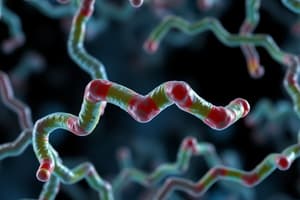Podcast
Questions and Answers
Which type of carbohydrates contain 3 carbon atoms?
Which type of carbohydrates contain 3 carbon atoms?
- Disaccharides
- Pentoses
- Hexoses
- Trioses (correct)
What functional group do aldoses contain?
What functional group do aldoses contain?
- Hydroxyl group (OH)
- Carboxylic group (COOH)
- Ketone group (C=O)
- Aldehyde group (-CHO) (correct)
Which classification of carbohydrates includes glucose and fructose?
Which classification of carbohydrates includes glucose and fructose?
- Trioses
- Monosaccharides (correct)
- Polysaccharides
- Disaccharides
What are ketoses?
What are ketoses?
Sucrose is an example of which type of carbohydrate?
Sucrose is an example of which type of carbohydrate?
Which type of carbohydrate is made up of many monosaccharide units linked together?
Which type of carbohydrate is made up of many monosaccharide units linked together?
How many carbon atoms do hexoses contain?
How many carbon atoms do hexoses contain?
What is the general formula for carbohydrates?
What is the general formula for carbohydrates?
Flashcards are hidden until you start studying
Study Notes
Carbohydrate structure
- Trioses are carbohydrates with three carbon atoms
- Aldoses are carbohydrates that contain an aldehyde functional group
- Monosaccharides are simple sugars that cannot be broken down into smaller units; glucose and fructose are examples
- Ketoses are carbohydrates that contain a ketone functional group
Carbohydrate classification
- Disaccharides are carbohydrates that are composed of two monosaccharides joined together; sucrose is an example
- Polysaccharides are complex carbohydrates made up of many monosaccharide units linked together
Other carbohydrate properties
- Hexoses are carbohydrates that have six carbon atoms
- The general formula for carbohydrates is (CH₂O)ₙ
Studying That Suits You
Use AI to generate personalized quizzes and flashcards to suit your learning preferences.




